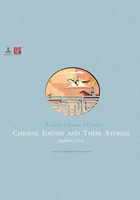
城门失火 (chéng mén shī huǒ)
City Gate on Fire
It happens quite often that someone is made a collateral victim for reasons which sound far-fetched or totally irrelevant. The Chinese Cheng Men Shi Huo, or “the city gate is on fire”, is a good description of such a circumstance.

Actually, this saying is only the first part of an expression concerning the death of fish in a moat surrounding the city gate.
Behind this popular Chinese saying is the following story:
Once upon a time, a city gate in the State of Song caught fire.
Many people rushed to the site carrying basins and buckets to help put out the fire.
However, they could not find any water nearby except that in the moat. So they formed a long queue to pass water from the moat to the site of the fire.
It took nearly half a day to bring the raging fire under control and by the time they did, the moat was almost dry.
It was then that the people realized that all the fish in the moat had died in the process. Some had been thrown into the fire and some had perished at the bottom of the moat. Those that survived had been taken home by firefighters as a windfall.
This incident was described in an article by Du Bi, a scholar in the Northern Qi Dynasty (550-577 AD), who created the phrase which means “when the city gate catches fire, it’s the fish in the moat that get burnt.”
The scholar’s phrase illustrates a situation where innocent bystanders could be victimized, even though they are not directly involved in the predicament.
Nowadays, this expression is still widely quoted in both written and spoken Chinese, partly because of the vividness of the saying itself but also due to the fact that the fish still die in a situation like the city gate being on fire.